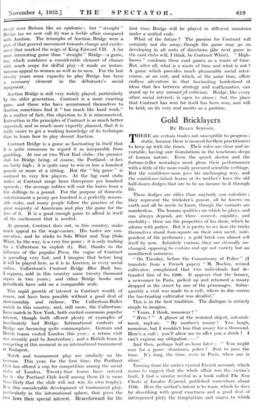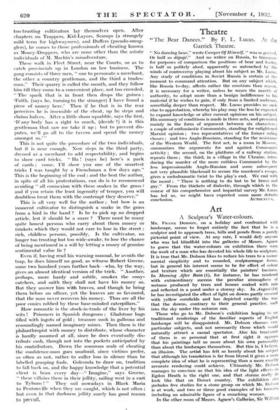Gold Bricklayers
THERE are certain trades not susceptible to progress ; static, because there is no need for their practitioners to keep up with the times. Their rules are clear and in- variable, having sure foundations in the tenebrous deeps of human nature. Even the quack doctor and the fortune-teller nowadays must gloze their performances with a little of the more easily procured scientific verbiage. But the confidence-man goes his unchanging way, and the confidence-infant learns at its mother's knee the old half-dozen dodges that are to be an income to it through life.
These dodges are older than anybody can calculate ; they represent the trickster's gamut, all he knows on earth and all he needs to know, though the variants are numberless. The human qualities on which he plays, and can always depend, are threc—conceit, cupidity, and credulity : these are the properties of his show, which he adorns with patter. But it is pretty to see how the tricks themselves stand four-square on their own merit, inde- pendent of the performer ; a gold brick can almost sell itself by now. Infinitely various, they are eternally un- changed, opposing to custom and age not variety but an unwithered sameness.
"On Tuesday, before the Commissary of Police" (1 translate from a French paper) " M. Machin, retired cultivator, complained that two individuals, had de- frauded him of frs. 1200. It appears that the former, a newcomer to Paris, picked up and returned a rosary dropped in the street by one of the personages. Subse- quently a visit was made to a cafe, where in due course the too-trusting cultivator was devalise."
This is in the best tradition. The dialogue is entirely simple to imagine.
"Yours, I think, monsieur ? "
"Hem?" A glance at the restored object, astonish- ment, rapture. ". My mother's rosary ! You laugh, monsieur; but I wouldn't lose that rosary for a thousand. Here's a cafe;, you'll allow me to offer you a drink ? I can't express my obligation And then, perhaps half an hour later : " You might care for a game—dominoes, poker ? Just to pass the time. It's long, the time, even in Paris, when one is alone."
Turning from the rather cynical French account, which seems to suggest that the whole affair was the victim's fault, I find a similar recital in a book called The New Cheats of London Exposed, published somewhere about 1760. Here the author's intent is to warn, which he does by describing with great exactness and a good deal of interspersed piety the temptations and snares to which too-trusting cultivators lay themselves open. After chapters on Trappers, Kid-Layers, Scamps (a strangely mild term for highwaymen), and Duffers (pseudo-smug- glers), he comes to those professionals of cheating known as Money-Droppers, who are none other than the astute individuals of M. Machin's misadventure.
These walk in Fleet Street, near the Courts, so as to catch provincials up in London on law business. The gang consists of three men, " one to personate a merchant, the other a country gentleman, and the third a trades- man." Their quarry is called the mouth, and they follow him till they come to a convenient place, not too crowded. "The spark that is in front then drops the guinea : 'Faith, (says he, turning to the stranger) I have found a piece of money here.' Then if he that is in the rear perceives he is insensible of the cheat, up he steps and claims halves. After a little sham squabble, says the first,. 'If any body has a right to snack, (decide ?) it is this gentleman that saw me take it up ; but to prevent dis- putes, we'll go all to the tavern and spend the money amongst us."
This is not quite the procedure of the two individuals, but it is near enough. Now steps in the third party, dressed as a merchant to add respectability, and begins to show card tricks. " Ha ! (says he) here's a pack of cards ; come, I'll show you one of the Smartest tricks I was taught by a Frenchman a few days ago.". This is the beginning of the end ; and the best the author, in spite of all his protestations, can do is to recommend avoiding "all connexion with these snakes in • the grass ; and if you retain the least ingenuity of temper, you will doubtless treat them with the contempt they deserve."
This is all very well for the author ; but how is an innocent cultivator to distinguish a snake in the grass from a bird in the hand ? Is he to pick up no dropped article, lest it should be a snare ? There must be many quite honest persons who carry about them money or trinkets which they would not care to lose in the street ; rich, childless persons, possibly. Is the cultivator, no longer too trusting but too wide-awake, to lose the chance of being mentioned in a will by letting a rosary of genuine sentimental value lie ?
Even if, having read his warning manual, he avoids the trap, he does himself no good, as witness Robert Greene, some two hundred years further back—who, by the way, gives an almost identical version of the trick.- "Another, perhaps, more hardy and subtle, smokes the cony. catchers, and saith they shall not have his money so. But they answer him with braves, and though he bring them before an officer, yet the knaves are so favoured, that the man never recovers his money. Thus are all the poor conies robbed by these base-minded caterpillars."
How romantic is the stock-in-trade of the liver by his wits ! Prisoners in Spanish dungeons ; Gladstone bags filled with ingots of gold ; treasure sunk in galleons a'nd resoundingly named imaginary mines. Then there is the philanthropist with money to distribute, whose character is hardly assumed at all, since he does eventually dis- tribute cash, though not -into the pockets anticipated by his contributors. Down the sonorous scale of cheating the confidence-man goes unafraid, since Victims- prefer, as often is not, rather to suffer loss in silence than be labelled grasping fools. Golconda to draw on, tradition to fall back on, and the happy knowledge that a potential client is born every day—" Imagine," says Greene, "these villains there in their jollity, sailing west in a cart to Tyburn ! " They sail nowadays in Black Maria to Pentonville when they are caught, which is not often ; but even in that darkness jollity surely has good reason
to prevail.











































 Previous page
Previous page